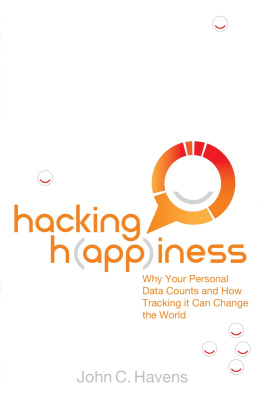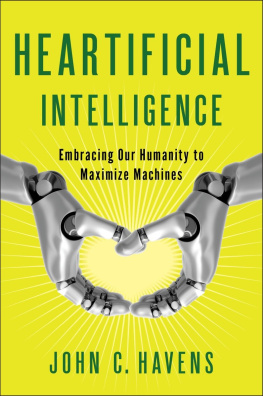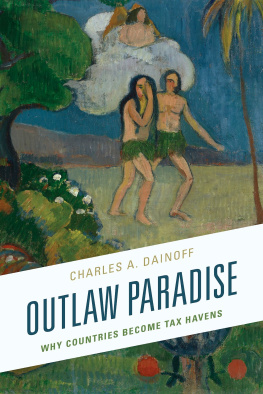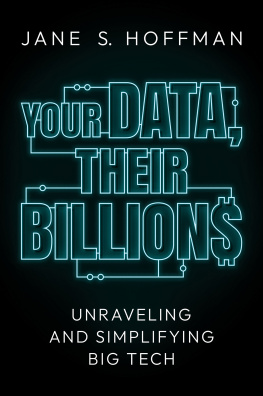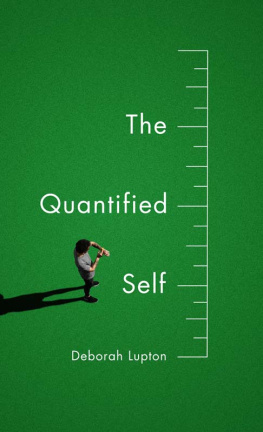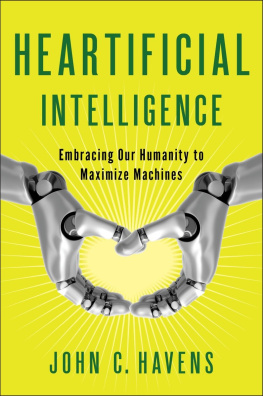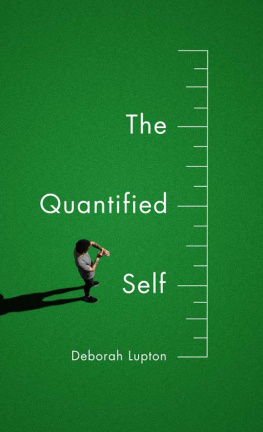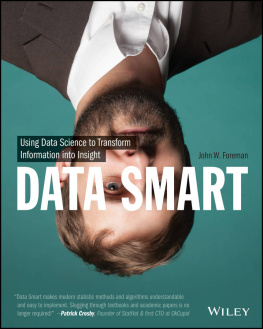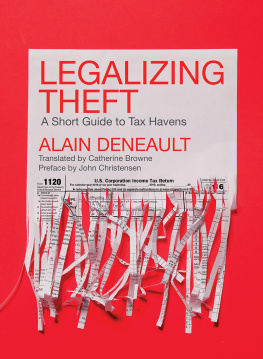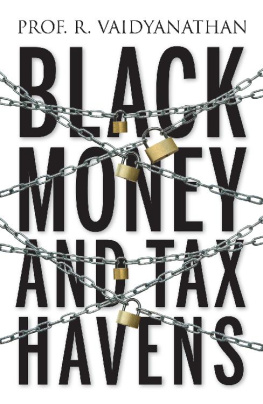More than any time in human history, we have access to mountains of data about ourselves. Hacking H(app)iness is the first book to show us how to leverage this information as a path to happiness, rather than a source of misery.
Adam Grant, New York Timesbestselling author of Give and Take, and Wharton professor
In Hacking H(app)iness, John C. Havens makes the persuasive case that a key to happiness in the digital age is being able to control and leverage your personal data for your own benefit. Its a must-read for anyone who wants to better understand the interplay of economics, innovation, and the rising personal data sector, and how you can make better, smarter decisions when youre in charge of your own data.
Shane Green, co-founder and CEO of Personal
Ive met and spoken with literally hundreds of people about aging and the consequences of isolation. Most of them knew the space; many of them understood the emotional impacts, but only John felt it. He intuitively understood how our societal focus on physical health was obscuring our view on emotional health.
Iggy Fanlo, co-founder and CEO of Live!y
The unexamined digital life is walking along an unstable ledge of happiness, in an era of digital exuberance. John C. Havenss Hacking H(app)iness is the balancing stick that allows us to synthesize and leverage technology by understanding the evolutionary value of ones digital blueprint, so that well-being and happiness can emerge.
Judy Martin, founder of WorkLifeNation.com and contributor for Forbes and NPR
John C. Havens gives us an illuminating examination of how emerging technology can be harnessed to promote individual, community, corporate, and global happiness. As one who studies intrinsic motivation, achievement, and happiness, I enjoyed Johns rare emphasis on altruistically serving others as a path toward greater happiness and health.
John Mark Froiland, Ph.D., assistant professor of psychology, University of Northern Colorado
In the twentieth century, we made great progress in terms of our material wealth, but were not really any happier. In this insightful book, John Havens shows us how the new century will bring us opportunities to improve our general well-being. Rather than keeping up with the Joneses, he explains how we can use technology to actually improve our lives. It is a truly remarkable work.
Greg Satell, contributing writer for Forbes
John Havens has written a comprehensive guide through our complicated digital lives, carefully examining the benefits of the data-driven pursuit of happiness through the lens of an enlightened idealist. A must-read for anyone interested in a humane future of connectivity.
Tim Leberecht, chief marketing officer of NBBJ
John Havens is leading the charge to change the way we talk and think about digital consumer technology. Rather than simply asking whether the latest gadget is faster or has more features, John encourages us to ask such questions as Will this make me happier? And its not just a rhetorical ploy; he wants us to think through the question sincerely. John avoids the knee-jerk conclusions of both the techno-fanboy and neo-Luddite campsto the occasional irritation of bothwhich makes his work all the more important.
Brian Wassom, augmented reality law expert, partner at Honigman Miller Schwartz and Cohn LLP
This book shows us that happiness can be an active pursuita journey filled with data and optimization, with satisfaction as the ultimate goal. Just reading this book made me happier.
Ari Meisel, author of Less Doing, More Living, founder of the Art of Less Doing, and Ironman triathlete
Hacking H(app)iness covers a whole range of technologies that are all emerging and looks at them from a positive perspective to see how they can help people, our communities, and the world. Johns approach is refreshing and adds new perspectives to consider how we as a society make considerations about what technologies to adopt and how they might fit together for the benefit of the whole.
Kaliya, aka Identity Woman
In Hacking H(app)iness, John C. Havens proves the importance of measuring our lives to identify our purpose versus just increasing profits or productivity. By showing how altruistic actions can increase happiness, Havens also provides a road map to scaling (or hacking) how the world perceives value, where currency will be based on compassion versus capitalism.
Aaron Hurst, author of The Purpose Economy, and CEO of Imperative

JEREMY P. TARCHER/PENGUIN
Published by the Penguin Group
Penguin Group (USA) LLC
375 Hudson Street
New York, New York 10014

USA Canada UK Ireland Australia New Zealand India South Africa China
penguin.com
A Penguin Random House Company
Copyright 2014 by John C. Havens
Penguin supports copyright. Copyright fuels creativity, encourages diverse voices, promotes free speech, and creates a vibrant culture. Thank you for buying an authorized edition of this book and for complying with copyright laws by not reproducing, scanning, or distributing any part of it in any form without permission. You are supporting writers and allowing Penguin to continue to publish books for every reader.
Most Tarcher/Penguin books are available at special quantity discounts for bulk purchase for sales promotions, premiums, fund-raising, and educational needs. Special books or book excerpts also can be created to fit specific needs. For details, write: Special.Markets@us.penguingroup.com.
Library of Congress Cataloging-in-Publication Data
Havens, John C.
Hacking happiness : why your personal data counts and how tracking it can change the world / John C. Havens.
p. cm.
ISBN 978-1-101-62195-0
1. Technological innovationsSocial aspects. 2. Self-monitoring. 3. Data miningSocial aspects. 4. Well-being. 5. Happiness. I. Title.
HM846.H38 2014 2013038876
303.483dc23
While the author has made every effort to provide accurate telephone numbers, Internet addresses, and other contact information at the time of publication, neither the publisher nor the author assumes any responsibility for errors, or for changes that occur after publication. Further, the publisher does not have any control over and does not assume any responsibility for author or third-party websites or their content.
Version_1
This book is dedicated to
David W. Havens, M.D.the man who listened.
CONTENTS
INTRODUCTION
I TS STRANGE to look at a screen and see a number that represents your life.
My dad had died three months earlier and I was grieving in my own way. Like a lot of people dealing with loss, that way involved distraction. The number I was looking at was a score from a service called Klout, a self-described authority for online influence. On Twitter, Facebook, and other social networks, a series of algorithms determined a number between one and one hundred, a representation of the digital me.

